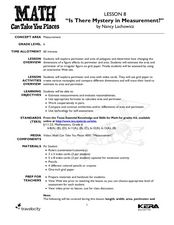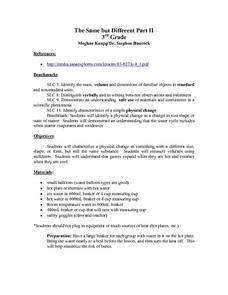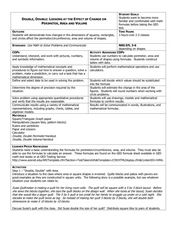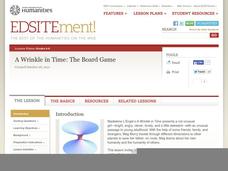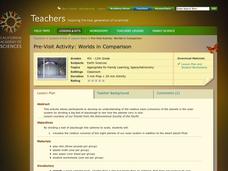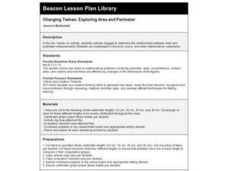Curated OER
The Study of Molecular Orientation by Linear Dimension Change of Polymeric Films
Students investigate the linear dimension change of heated plastic film and relate the results to processing and service use of the materials. They calculate percent change in dimension as related to anisotropy and molecular reorientation.
Curated OER
Effects of Changing Dimensions Proportionally
For this geometry worksheet, 10th graders examine the effect of changing the dimensions of a figure proportionally on the perimeter, circumference, and area. The one page worksheet contains six problems. Answers are...
Curated OER
Is There Mystery in Measurement?
Investigate perimeter and area of polygons! In this measurement lesson, learners use index cards to create rectangles and trace their hand to estimate its area and perimeter.
Teach Engineering
Statistical Analysis of Flexible Circuits
Scholars connect statistical analysis with flexible electric circuits. They first learn about flexible circuits and their applications through a PowerPoint presentation and then consider how the fabrication process for these circuits...
Curated OER
The Same, But Different Part II
Learners characterize a physical change as something that changes to a different size, but retains its basic substance. They measure volumes using milliliters, and perform an experiment that proves that gases expand when hot and contract...
National Nanotechnology Infrastructure Network
Synthesis and Characterization of CdSe Quantum Dots
Does the size of a sample change the physical properties of that substance? It turns out it can! Young scientists combine physics and chemistry to synthesize CdSe quantum dots and record their color properties. Learners should...
Curated OER
Double, Double: Looking at the Effect of Change on Perimeter, Area and Volume
Students explore perimeter, volume, and area. In this math instructional activity, students explore how changes in dimensions of geometric shapes affect the perimeter, area and volume of the various shapes. Students investigate the...
Curated OER
How Big Is That Star?
Aspiring astronomers study stars. They compare stars and explain the relationship between radius, mass, and diameter. By creating a star simulation, they discover how a binary star system's orbit can cause changes in the observed...
National Gallery of Canada
The Changing Composition
Play with dimensions and practice making a two-dimensional scene look three-dimensional. Class members view pieces of art and then make their own scenes by layering different materials and drawing in details. Check out all the tabs for...
Teach Engineering
Airplane Tails and Wings: Are You in Control?
Keep everything under control. The lesson, the 16th segment in a 22-part unit, provides a more detailed look at the parts of a plane, specifically the control surfaces. Pupils learn about the construction of the wings and the tails and...
National Endowment for the Humanities
A Wrinkle in Time: The Board Game
Tackle some big questions about A Wrinkle in Time by Madeleine L'Engle with a board game project. As learners brainstorm for and complete their board games, they consider what helps and hinders Meg on her journey and why she succeeds in...
Curated OER
Dimensions and Area
Learners explore the area of rectangles in this middle school geometry lesson. They will investigate the relationship between a change in the dimensions of a rectangle and the change in the corresponding area. Learners also investigate...
Pacific Science Center
Worlds in Comparison
Young astronomers follow a step-by-step procedure for dividing a lump of dough into parts, resulting in a scaled volume set of puny planets. Along with the printable directions is a template chart of planet names on which learners can...
EngageNY
Computing Actual Lengths from a Scale Drawing
The original drawing is eight units — how big is the scale drawing? Classmates determine the scale percent between a scale drawing and an object to calculate the length of a portion of the object. They use the percent equation to find...
LABScI
Vision Lab: The Eye
Our bodies have some amazing capabilities, but there are some limitations. Explore the limitations of the human eye through the eighth lab activity in a series of 12 biology lessons. Individuals measure their own peripheral vision...
Curated OER
Lesson 4 Activity 1: Mapping the Third Dimension
Students work in pairs to construct a simple stereoscope.
Curated OER
Maximize area
For this subscription-based activity, algebra learners model changes in the length and width of a rectangle to determine the maximum area possible for a given perimeter and solve several application problems involving area, included in...
Alabama Learning Exchange
Dog Gone Again!
Here is a real-life lesson! Learners must plan the dimensions of a rectangular fence to reign in a runaway dog. They survey what shape and size fence is needed and use formulas to find perimeter and area of the fence. They explore what...
Polar Bears International
Taking Action!
Motivate young scientists to stand up and take action with this environmental science lesson. To begin, the class works in small groups brainstorming actions that support the conservation of the earth before creating and implementing an...
National Endowment for the Humanities
Cultural Change
High schoolers research the passage of the 19th Amendment as an illustration of the mutual influence between political ideas and cultural attitudes. They also read the Seneca Falls Declaration and explore the cultural shifts it both...
Curated OER
Problem Based Learning Scenario
Students research about the function of MPA's. For this marine science lesson, students explore how humans influence changes near these areas. They explore different MPA's in the Great Lakes region.
Media Education Lab
The Ethics of Propaganda
What are the short and long-term consequences for consumers and producers of modern media propaganda? Class members ponder this essential question as their unit study of ethics of propaganda concludes. After examining two case...
Curated OER
Changing Twines: Exploring Area and Perimeter
Third graders review formulas for area and perimeter in quadrilaterals. They arrange pre-cut twine on a centimeter graph paper to create non-congruent quadrilaterals. They calculate the perimeter and area of each form.
LABScI
Conservation of Momentum: Marble Collisions
What happens to the momentum of an object when it strikes another object? Scholars roll a marble down a ramp so it collides with another marble. By measuring the speed of each marble before and after the collision, pupils answer this...


